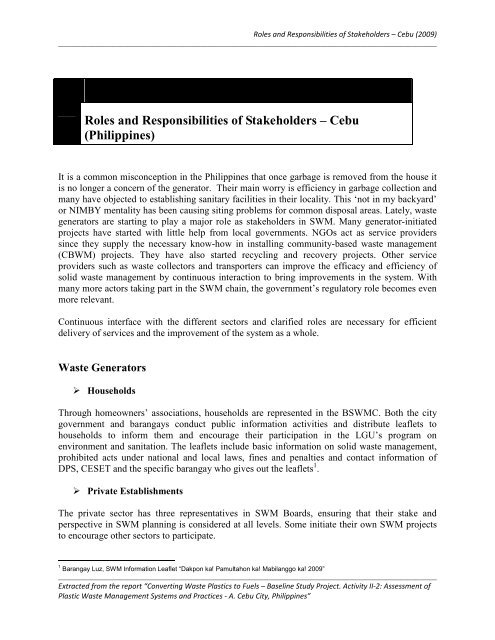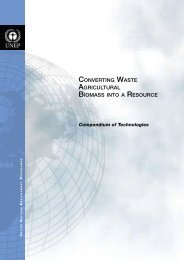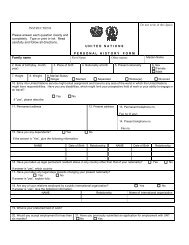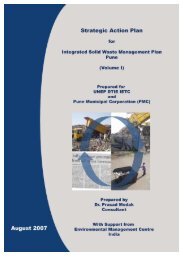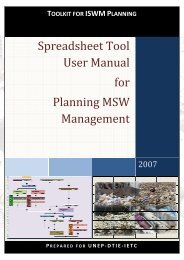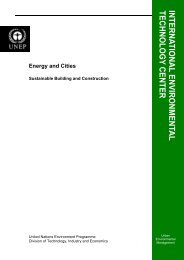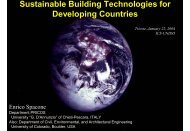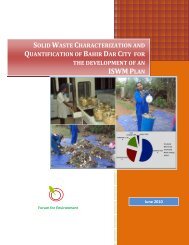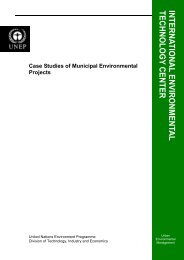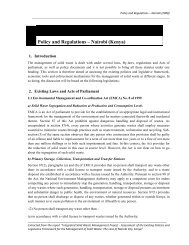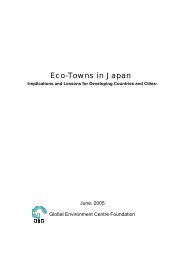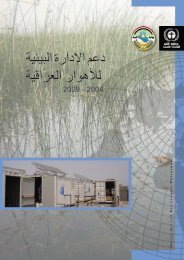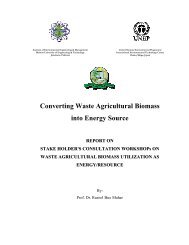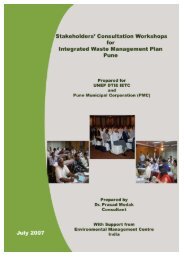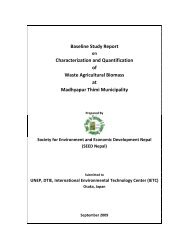Roles and Responsibilities of Stakeholders â Cebu ... - UNEP
Roles and Responsibilities of Stakeholders â Cebu ... - UNEP
Roles and Responsibilities of Stakeholders â Cebu ... - UNEP
Create successful ePaper yourself
Turn your PDF publications into a flip-book with our unique Google optimized e-Paper software.
<strong>Roles</strong> <strong>and</strong> <strong>Responsibilities</strong> <strong>of</strong> <strong>Stakeholders</strong> – <strong>Cebu</strong> (2009)<br />
________________________________________________________________________________________________________<br />
<strong>Roles</strong> <strong>and</strong> <strong>Responsibilities</strong> <strong>of</strong> <strong>Stakeholders</strong> – <strong>Cebu</strong><br />
(Philippines)<br />
It is a common misconception in the Philippines that once garbage is removed from the house it<br />
is no longer a concern <strong>of</strong> the generator. Their main worry is efficiency in garbage collection <strong>and</strong><br />
many have objected to establishing sanitary facilities in their locality. This ‘not in my backyard’<br />
or NIMBY mentality has been causing siting problems for common disposal areas. Lately, waste<br />
generators are starting to play a major role as stakeholders in SWM. Many generator-initiated<br />
projects have started with little help from local governments. NGOs act as service providers<br />
since they supply the necessary know-how in installing community-based waste management<br />
(CBWM) projects. They have also started recycling <strong>and</strong> recovery projects. Other service<br />
providers such as waste collectors <strong>and</strong> transporters can improve the efficacy <strong>and</strong> efficiency <strong>of</strong><br />
solid waste management by continuous interaction to bring improvements in the system. With<br />
many more actors taking part in the SWM chain, the government’s regulatory role becomes even<br />
more relevant.<br />
Continuous interface with the different sectors <strong>and</strong> clarified roles are necessary for efficient<br />
delivery <strong>of</strong> services <strong>and</strong> the improvement <strong>of</strong> the system as a whole.<br />
Waste Generators<br />
Households<br />
Through homeowners’ associations, households are represented in the BSWMC. Both the city<br />
government <strong>and</strong> barangays conduct public information activities <strong>and</strong> distribute leaflets to<br />
households to inform them <strong>and</strong> encourage their participation in the LGU’s program on<br />
environment <strong>and</strong> sanitation. The leaflets include basic information on solid waste management,<br />
prohibited acts under national <strong>and</strong> local laws, fines <strong>and</strong> penalties <strong>and</strong> contact information <strong>of</strong><br />
DPS, CESET <strong>and</strong> the specific barangay who gives out the leaflets 1 .<br />
Private Establishments<br />
The private sector has three representatives in SWM Boards, ensuring that their stake <strong>and</strong><br />
perspective in SWM planning is considered at all levels. Some initiate their own SWM projects<br />
to encourage other sectors to participate.<br />
1 Barangay Luz, SWM Information Leaflet “Dakpon ka! Pamultahon ka! Mabilanggo ka! 2009”<br />
________________________________________________________________________________________________________<br />
Extracted from the report “Converting Waste Plastics to Fuels – Baseline Study Project. Activity II-2: Assessment <strong>of</strong><br />
Plastic Waste Management Systems <strong>and</strong> Practices - A. <strong>Cebu</strong> City, Philippines”
<strong>Roles</strong> <strong>and</strong> <strong>Responsibilities</strong> <strong>of</strong> <strong>Stakeholders</strong> – <strong>Cebu</strong> (2009)<br />
________________________________________________________________________________________________________<br />
The Philippine Environment Partnership Program (PEPP) 2<br />
The PEPP is a DENR partnership program with industries, in cooperation with the other<br />
environment-related agencies, pursuant to DA0 03-14. Its purpose is to promote m<strong>and</strong>atory selfmonitoring<br />
<strong>and</strong> compliance with environmental st<strong>and</strong>ards <strong>and</strong> to encourage voluntary selfregulation<br />
<strong>of</strong> industrial establishments. It also seeks to provide incentives <strong>and</strong> package <strong>of</strong><br />
assistance to establishments particularly SMEs to achieve pollution prevention <strong>and</strong> cleaner<br />
production process <strong>and</strong> to build or enhance the capability <strong>of</strong> establishments <strong>and</strong>/or their<br />
associations on self-regulation.<br />
All establishments that are governed by relevant environmental laws, rules <strong>and</strong> regulations such<br />
as industrial <strong>and</strong> commercial establishment, in general, both public <strong>and</strong> private, including agriindustrial<br />
facilities, manufacturing <strong>and</strong> commercial enterprises <strong>and</strong> other facility services are<br />
covered under this program. Participation could be through individual establishments or industry<br />
associations.<br />
SM City <strong>Cebu</strong><br />
The Green Bag is a national program for SM, the biggest mall chain in the country. This program<br />
was launched simultaneously in SM Malls, including SM City <strong>Cebu</strong>. It aims to reduce single-use<br />
plastic bags given to customers <strong>of</strong> the department store <strong>and</strong> supermarket.<br />
In 2007 they sold the Green Bag for only P35.00 for a certain purchase. Now the bag can be<br />
bought without any purchase needed from any <strong>of</strong> the stores. This July, the malls have also<br />
launched the My Own Bag (MOB) Campaign wherein the shoppers are encouraged to bring their<br />
own bag in the grocery. Aside from the Green Bag, color-coded garbage bins are also placed<br />
through the mall to encourage mall goers to segregate. It is also part <strong>of</strong> SM’s ongoing<br />
environmental information campaign. 3<br />
2 Environmental Management Bureau Official Website” 18 June 2009, http://www.emb.gov.ph/pepp/index.html#<br />
3 Personal observation<br />
________________________________________________________________________________________________________<br />
Extracted from the report “Converting Waste Plastics to Fuels – Baseline Study Project. Activity II-2: Assessment <strong>of</strong><br />
Plastic Waste Management Systems <strong>and</strong> Practices - A. <strong>Cebu</strong> City, Philippines”
<strong>Roles</strong> <strong>and</strong> <strong>Responsibilities</strong> <strong>of</strong> <strong>Stakeholders</strong> – <strong>Cebu</strong> (2009)<br />
________________________________________________________________________________________________________<br />
Figure 5. Solid Waste Management Initiatives in SM City <strong>Cebu</strong><br />
Color-coded garbage bins<br />
SM Green Bag Campaign<br />
<strong>Cebu</strong> Holdings, Inc. (CHI)<br />
To involve both establishments <strong>and</strong> residents in CHI’s environmental program, participation was<br />
encouraged in the CBP-NBAAI. All merchants based in Ayala Business Park <strong>and</strong> Asia Town IT<br />
Park <strong>Cebu</strong>, <strong>and</strong> other commercial establishments under <strong>Cebu</strong> Holdings Inc. are currently<br />
involved in the program. To initiate this, CHI donated a garbage truck each to Barangays Luz,<br />
Careta, Hipodromo, Mabolo, Apas <strong>and</strong> Kamputhaw through the CBP-NBAAI.<br />
Ayala Foundation also forged partnerships with the Asian Institute <strong>of</strong> Management, Ayala L<strong>and</strong>,<br />
<strong>and</strong> Ayala Property Management Corporation for the Ayala-AIM Environmental Capacity<br />
Building Program. Under this program, AIM will develop an environmental course for urban<br />
planners <strong>and</strong> building designers from the government <strong>and</strong> private sectors. Bringing in the<br />
experience <strong>and</strong> expertise <strong>of</strong> the Ayala group in solid waste management, this partnership is<br />
expected to evolve into a Center for Environmental Excellence, which will act as a catalyst in<br />
shaping urban environmental policy <strong>and</strong> practice. 4<br />
Service providers<br />
Mantech<br />
There are many SWM service providers operating in the Province <strong>of</strong> <strong>Cebu</strong> <strong>and</strong> the City as well.<br />
However, most <strong>of</strong> them are unlisted <strong>and</strong>/or unwilling to be interviewed. Only Man-tech willingly<br />
4 <br />
________________________________________________________________________________________________________<br />
Extracted from the report “Converting Waste Plastics to Fuels – Baseline Study Project. Activity II-2: Assessment <strong>of</strong><br />
Plastic Waste Management Systems <strong>and</strong> Practices - A. <strong>Cebu</strong> City, Philippines”
<strong>Roles</strong> <strong>and</strong> <strong>Responsibilities</strong> <strong>of</strong> <strong>Stakeholders</strong> – <strong>Cebu</strong> (2009)<br />
________________________________________________________________________________________________________<br />
shared their information. Mantech, although based in M<strong>and</strong>aue, serves commercial<br />
establishments in <strong>Cebu</strong>.<br />
Government<br />
In the same light, President Arroyo signed the Executive Order 774 -Reorganizing the<br />
Presidential Task Force on Climate Change (PTFCC) on December 26, 2008. E.O.<br />
774 required 50% reduction in solid waste generation for the next six months. E.O. 774<br />
identified the DENR to lead a SWM Task Group <strong>and</strong> enjoined all local governments to<br />
fully implement the law on solid waste management. 5<br />
Government agencies, from the NSWMC down to the local SWM boards, are m<strong>and</strong>ated to<br />
conduct trainings, seminars, release publications <strong>and</strong> tri-media materials <strong>and</strong> conduct information<br />
<strong>and</strong> enforcement activities to encourage various sectors to participate in solid waste<br />
management. One <strong>of</strong> such programs is the Zero Basura Campaign.<br />
Zero Basura Olympics Philippine Garbology Marathon 2008 6<br />
ZBO was initiated to mobilize participation <strong>of</strong> different sectors <strong>and</strong> to encourage LGUs to<br />
comply with RA 9003. It will be a nationwide contest that will involve not only the LGU but<br />
different sectors as well. Its objectives are as follows:<br />
1. To promote multi-stakeholder cooperation to attain <strong>and</strong> sustain ESWM Programs at the<br />
LGU-wide level<br />
2. To assist LGUs in the formulation <strong>and</strong> implementation <strong>of</strong> an effective <strong>and</strong> doable ESWM<br />
program through a social mobilization program<br />
3. To identify, validate, document <strong>and</strong> recognize different stakeholders <strong>and</strong> LGUs<br />
successfully implementing ESWM Programs<br />
4. To highlight <strong>and</strong> recognize novel <strong>and</strong> creative ESWM approaches that can serve as models<br />
for other LGUs to learn from<br />
5. To develop a self-monitoring system for LGUs to track <strong>and</strong> benchmark compliances with<br />
RA 9003 <strong>and</strong> incorporate the same in DILG's Local Government Performance<br />
Measurement System (LGPMS).<br />
The three categories for LGU contestants are based on the IRA allotment to facilitate an evenh<strong>and</strong>ed<br />
evaluation among LGUs within the same income levels. The first category is the Highly<br />
5 “E.O. 774”, May 15, 2009, <br />
6 Zero Basura Olympics Philippine Garbology Marathon 2008, July 18, 2009<br />
________________________________________________________________________________________________________<br />
Extracted from the report “Converting Waste Plastics to Fuels – Baseline Study Project. Activity II-2: Assessment <strong>of</strong><br />
Plastic Waste Management Systems <strong>and</strong> Practices - A. <strong>Cebu</strong> City, Philippines”
<strong>Roles</strong> <strong>and</strong> <strong>Responsibilities</strong> <strong>of</strong> <strong>Stakeholders</strong> – <strong>Cebu</strong> (2009)<br />
________________________________________________________________________________________________________<br />
Urbanized <strong>and</strong> Component Cities, second is the First to Third Class Municipalities <strong>and</strong> last is the<br />
Fourth to Sixth Class Municipalities. The winners will be awarded in August 2009.<br />
Intensifying Zero Basura campaign 7<br />
President Arroyo recently directed the PTFCC to intensify the Zero Basura Campaign <strong>and</strong> called<br />
on LGUs to set up MRFs at the barangay level. She informed local <strong>of</strong>ficials present during the<br />
briefing that compared to open dump site <strong>and</strong> sanitary l<strong>and</strong> fills, the MRF is the best alternative<br />
solution to mitigate climate change. She also asked the DENR to assist municipal <strong>and</strong> city<br />
governments in financing the establishment <strong>of</strong> MRF's in their areas <strong>of</strong> jurisdiction. At the<br />
briefing, Undersecretary Geroche informed the President that the DENR is ready to provide a<br />
cash grant equivalent <strong>of</strong> 20 percent up to 50 percent <strong>of</strong> the total expenses needed for the<br />
establishment <strong>of</strong> MRF at the barangay level. He said each MRF is worth P183,000.00<br />
<strong>Cebu</strong> City, however, is no longer qualified for this subsidy since it is a chartered city <strong>and</strong> not<br />
qualified for the released Php 100 million to the provincial government for the SWM programs<br />
<strong>of</strong> component cities <strong>and</strong> municipalities.<br />
SWM MOA among <strong>Cebu</strong> LGUs 8<br />
Another approach to intensify involvement <strong>of</strong> different sectors in SWM is the MOA entered into<br />
by 51 mayors <strong>of</strong> <strong>Cebu</strong> LGUS in July for a joint implementation <strong>of</strong> SWM called Disposal <strong>of</strong><br />
Garbage <strong>and</strong> Waste Enforcement for Nature (D’GWEN) <strong>and</strong> Vermiculture Composting<br />
Programs, the initiative is a collaboration among LGUs for a systematic garbage recycling <strong>and</strong><br />
composting program. Provincial Governor Gwendolyn Garcia said the provincial government<br />
will support the LGUs, especially the barangays, by giving capital assistance for garbage<br />
reduction <strong>and</strong> segregation programs. The provincial government will provide P15,000.00 to each<br />
barangay, to be taken from the Php 100 million seed money President Arroyo allotted to the<br />
provincial government for SWM.<br />
Each barangay <strong>and</strong> town will have their own account with the Development Bank <strong>of</strong> the<br />
Philippines <strong>and</strong> will be issued individual ledgers. DBP will help monitor the accounts. Revenues<br />
from the program are not allowed to be used for at least a year. Under the agreement, the towns<br />
will purchase recycled materials from the barangays <strong>and</strong> the province, in turn, will buy recycled<br />
materials from the towns.<br />
7 PGMA to PTFCC: Intensify the Zero Basura Campaign Friday, 14 August 2009<br />
<br />
8 <strong>Cebu</strong> Mayors ink joint agreement for solid waste management By MARS. W. MOSQUEDA JR.<br />
July 23, 2009, 7:16pm <br />
________________________________________________________________________________________________________<br />
Extracted from the report “Converting Waste Plastics to Fuels – Baseline Study Project. Activity II-2: Assessment <strong>of</strong><br />
Plastic Waste Management Systems <strong>and</strong> Practices - A. <strong>Cebu</strong> City, Philippines”
<strong>Roles</strong> <strong>and</strong> <strong>Responsibilities</strong> <strong>of</strong> <strong>Stakeholders</strong> – <strong>Cebu</strong> (2009)<br />
________________________________________________________________________________________________________<br />
Summary Data Sheet<br />
Table 11 summarizes the process <strong>and</strong> level <strong>of</strong> stakeholder participation in SWM in the city.<br />
Measures should be taken to encourage waste generators <strong>and</strong> LGUs to comply <strong>and</strong> go beyond<br />
mere compliance in proper treatment <strong>and</strong> disposal <strong>of</strong> wastes.<br />
To many residents, waste treatment <strong>and</strong> disposal seemed to be a territory <strong>of</strong> the LGUs <strong>and</strong> not<br />
their own. Yet, ideally, waste generators should be active in participating in all levels <strong>of</strong> the<br />
waste management chain, from mere compliance to vigilance on the compliance <strong>of</strong> other sectors.<br />
Regulatory institutions, on the other h<strong>and</strong>, face difficulties in monitoring <strong>and</strong> enforcement,<br />
mainly because they lack human <strong>and</strong> financial resources to do so. Recently, two major issuances<br />
did little to elicit major response from concerned LGUs. First is the 3-Strike Policy issued in<br />
2008 to non-complying LGUs <strong>and</strong> second is the EO 774 wherein another six-month ultimatum<br />
was given to LGUs regarding the closure <strong>of</strong> their open or controlled dumpsites. Lest the LGUs<br />
become anesthetized on such issuances, the government should take on more innovative <strong>and</strong><br />
proactive approaches to get LGUs to comply.<br />
Industries’ solid waste management is mainly self-monitored because regulatory bodies like the<br />
EMB do not have the capability to examine the performance <strong>of</strong> individual companies.<br />
NGOs like Sagip Pasig Movement (based in Manila) embarked on a public disclosure program<br />
or shame campaign to expose to the public industries not complying with effluent st<strong>and</strong>ards.<br />
Using data from the periodic monitoring <strong>of</strong> EMB Manila, the list <strong>of</strong> top polluters were given to<br />
the media. SPM then called on the public to boycott the products <strong>of</strong> the polluting industries. The<br />
campaign has resulted to major impacts in industry environmental performance in Metro Manila.<br />
Later, it gave birth to numerous enabling partnerships between SPM, their partner communities<br />
<strong>and</strong> former Lason sa Ilog (Poison to the River) Awardees. 9<br />
It is certainly acceptable to engage in such radical measures to reiterate the urgency <strong>of</strong> RA 9003<br />
compliance. However, this time, LGUs will be the ones at the receiving end.<br />
9 Personal observation as SPM consultant.<br />
________________________________________________________________________________________________________<br />
Extracted from the report “Converting Waste Plastics to Fuels – Baseline Study Project. Activity II-2: Assessment <strong>of</strong><br />
Plastic Waste Management Systems <strong>and</strong> Practices - A. <strong>Cebu</strong> City, Philippines”
<strong>Roles</strong> <strong>and</strong> <strong>Responsibilities</strong> <strong>of</strong> <strong>Stakeholders</strong> – <strong>Cebu</strong> (2009)<br />
________________________________________________________________________________________________________<br />
Table 12. Stakeholder Participation in Solid Waste Management, <strong>Cebu</strong> City (1/2)<br />
TYPE OF<br />
MEASURES TO IMPROVE<br />
MAJOR STAKEHOLDERS<br />
SERVICE<br />
PARTICIPATION<br />
Waste Plastics from Residential <strong>and</strong> Commercial Sector<br />
Representation in<br />
policy <strong>and</strong> planning<br />
development<br />
Source Reduction<br />
Collection <strong>and</strong><br />
Transportation<br />
Treatment<br />
Disposal<br />
Recovery <strong>and</strong><br />
Recycling<br />
-Homeowners Associations<br />
-Parent Teachers Associations<br />
-Government Institutions<br />
-Commercial Establishments<br />
-Haulers, Transporters, Recyclers<br />
Buyers<br />
LGUs through PSWMB, CSWMB<br />
<strong>and</strong> BSWMC<br />
NGOs<br />
Schools<br />
Commercial Establishments i.e.<br />
malls<br />
Private Haulers, transporters<br />
DPS-Waste Collection Unit<br />
Barangay Eco-aides<br />
Waste Generators<br />
DPS<br />
Private Service Providers<br />
Waste Generators (Hospitals, etc.)<br />
DPS<br />
Private Service Providers<br />
Waste Generators (Hospitals, etc.)<br />
-Regulators: DPS, CSWMB,<br />
BSWMB<br />
-Waste generators:<br />
-Service Providers:<br />
Representation in various<br />
institutions such as:<br />
City SWM Board<br />
Barangay SWM Board<br />
Trainings, Public Information<br />
Campaigns for Waste Reduction<br />
at source<br />
Ex. Green Bag Campaign<br />
Regular schedule <strong>of</strong> collection<br />
Regular pick-up points<br />
Continuous dispatch <strong>of</strong> collection<br />
crew<br />
Trainings <strong>and</strong> Workshops<br />
Public Information activities<br />
PARTICIPATION<br />
-Sectors represented in relevant<br />
SWM Bodies<br />
Although actual <strong>and</strong> effective<br />
participation <strong>and</strong> yet to be assessed.<br />
-LGUs, NGOs <strong>and</strong> corporate<br />
foundations take lead in SWM<br />
Public Info Programs<br />
Wider reach <strong>of</strong> these initiatives still<br />
required to mainstream source<br />
reduction<br />
-Due to regular schedules <strong>and</strong> pickup<br />
points, waste generators are<br />
encouraged to comply. Continuous<br />
information <strong>of</strong> schedules <strong>and</strong> other<br />
information needed.<br />
-Merely compliance or lack <strong>of</strong>,<br />
needs more proactive approach<br />
-Merely compliance or lack <strong>of</strong>,<br />
needs more proactive approach<br />
-Taking lead<br />
-Majority not being reached<br />
-Must be monitored regularly<br />
-Must mainstream the industry<br />
________________________________________________________________________________________________________<br />
Extracted from the report “Converting Waste Plastics to Fuels – Baseline Study Project. Activity II-2: Assessment <strong>of</strong> Plastic Waste Management Systems <strong>and</strong><br />
Practices - A. <strong>Cebu</strong> City, Philippines”
<strong>Roles</strong> <strong>and</strong> <strong>Responsibilities</strong> <strong>of</strong> <strong>Stakeholders</strong> – <strong>Cebu</strong> (2009)<br />
________________________________________________________________________________________________________<br />
Monitoring <strong>and</strong><br />
Enforcement<br />
-Junk shops, buyers, recyclers<br />
-NGOs<br />
-Commercial Establishments<br />
-Waste Pickers (Ex. GKKLPMPC)<br />
-NSWMC<br />
-PTFCC<br />
-LGUs<br />
Cooperative formation<br />
Monitoring <strong>of</strong> SWM Plans<br />
EO 774<br />
Zero Basura Campaign<br />
-Initiating small scale projects<br />
-Must take more active role<br />
-Active but not given safety <strong>and</strong><br />
security<br />
-Undermanned, not enough<br />
resources<br />
-More vigorous enforcement needed<br />
Cooperation<br />
International Organizations<br />
Government Finance Institutions<br />
Local Government Units<br />
Grants, subsidies, joint projects<br />
Ex. D’GWEN (<strong>Cebu</strong> LGUs<br />
MOA on SWM)<br />
-Limited window for support<br />
-Lack <strong>of</strong> resources <strong>and</strong> tech<br />
capability to<br />
Table 12. Continuation (2/2)<br />
TYPE OF<br />
MAJOR STAKEHOLDERS<br />
SERVICE<br />
Waste Plastics from Industrial Sector<br />
Source Reduction Individual industrial<br />
establishments<br />
Corporate organizations such as<br />
PBSP, PBE, <strong>Cebu</strong> Chamber <strong>of</strong><br />
Commerce<br />
<strong>Cebu</strong> Business Council<br />
Proper Disposal Individual industrial<br />
establishments<br />
MEASURES TO IMPROVE<br />
PARTICIPATION<br />
ISO Certification<br />
Corporate st<strong>and</strong>ardization<br />
Corporate Social Responsibility<br />
Projects<br />
Joint Programs <strong>and</strong> Projects<br />
Self-Monitoring Reports<br />
PEPP<br />
PARTICIPATION<br />
-Needs more proactive, green<br />
production approaches<br />
-industry waste generators should<br />
take lead in source reduction as it<br />
is an upstream sector in the SWM<br />
chain.<br />
-Merely compliance or lack <strong>of</strong>,<br />
needs more proactive approach<br />
-Smaller establishments lack<br />
know-how <strong>and</strong> resources<br />
Recovery <strong>and</strong> Individual industrial Specific Projects for both Companies usually have their<br />
________________________________________________________________________________________________________<br />
Extracted from the report “Converting Waste Plastics to Fuels – Baseline Study Project. Activity II-2: Assessment <strong>of</strong> Plastic Waste Management Systems <strong>and</strong><br />
Practices - A. <strong>Cebu</strong> City, Philippines”
<strong>Roles</strong> <strong>and</strong> <strong>Responsibilities</strong> <strong>of</strong> <strong>Stakeholders</strong> – <strong>Cebu</strong> (2009)<br />
________________________________________________________________________________________________________<br />
Recycling<br />
establishments<br />
Corporate organizations such as<br />
PBSP, PBE, <strong>Cebu</strong> Chamber <strong>of</strong><br />
Commerce<br />
<strong>Cebu</strong> Business Council<br />
Waste Plastics from Specific Wastes such as E-waste<br />
Recovery <strong>and</strong><br />
Recycling<br />
Industries<br />
Commercial Establishments<br />
NGOs<br />
Waste Generators<br />
individual <strong>and</strong> corporate<br />
organizations<br />
Corporate Social Responsibility<br />
Projects<br />
Balik Cellphone<br />
Trash for Cash<br />
IWEX<br />
contract buyers <strong>of</strong> scrap materials<br />
so majority <strong>of</strong> recycling is not<br />
done at their end.<br />
Not yet mainstreamed, minimal<br />
participation<br />
________________________________________________________________________________________________________<br />
Extracted from the report “Converting Waste Plastics to Fuels – Baseline Study Project. Activity II-2: Assessment <strong>of</strong> Plastic Waste Management Systems <strong>and</strong><br />
Practices - A. <strong>Cebu</strong> City, Philippines”
<strong>Roles</strong> <strong>and</strong> <strong>Responsibilities</strong> <strong>of</strong> <strong>Stakeholders</strong> – <strong>Cebu</strong> (2009)<br />
________________________________________________________________________________________________<br />
________<br />
Comments on stakeholders’ participation <strong>and</strong> other challenges<br />
In actual practice, residents wait for the schedule <strong>of</strong> collection their area. They then take<br />
out their garbage. Out <strong>of</strong> sight, out <strong>of</strong> mind. Segregation is practiced only at a certain<br />
level, but only because there are buyers (<strong>and</strong> beggars) <strong>of</strong> recyclables going around<br />
communities to gather waste plastics <strong>and</strong> glass bottles they can sell to small junkshops.<br />
Collection crew usually do not check on the garbage they load if these are segregated,<br />
<strong>and</strong> if so, assign an area where a specific material should be placed inside the dump truck<br />
or compactor for that matter. But there is also a common practice where collection crews<br />
get as much saleable items as they can <strong>and</strong> place them inside sacks <strong>and</strong> bakat at the side<br />
<strong>of</strong> the truck. This becomes a part <strong>of</strong> the informal waste recovery system, since they sell<br />
these items on their own.<br />
Commercial establishments <strong>and</strong> industries contract out hauling <strong>and</strong> disposal services. But<br />
<strong>of</strong>ten they have an MRF or a segregation area where saleable items are stored <strong>and</strong> sold to<br />
medium or major buyers.<br />
Buyers on the other h<strong>and</strong>, operate mostly for trading outside. The bulk <strong>of</strong> the plastic<br />
waste being recovered is transported outside the province for recycling. Local recycling<br />
would add more value to these materials since transport costs will be reduced.<br />
Given this set-up, a systematic overhaul is needed to define the roles <strong>of</strong> each stakeholder<br />
in SWM chain <strong>and</strong> shift the focus <strong>of</strong> attention from mere disposal to recovery <strong>and</strong><br />
recycling.<br />
More multi-sectoral information activities should be held, so as to inform other<br />
stakeholders <strong>of</strong> the entire waste management chain, <strong>and</strong> clarify that their day to day<br />
practices impact the system. Specific roles <strong>of</strong> each sector will then be delineated, <strong>and</strong> as<br />
needed, interface <strong>and</strong> overlaps defined.<br />
________________________________________________________________________________________________<br />
________<br />
Extracted from the report “Converting Waste Plastics to Fuels – Baseline Study Project. Activity II-2:<br />
Assessment <strong>of</strong> Plastic Waste Management Systems <strong>and</strong> Practices - A. <strong>Cebu</strong> City, Philippines”


